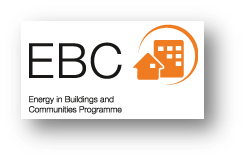About IEA and EBC
About EBC
In recognition of the significance of energy use in buildings, in 1977 the International Energy Agency has established an Implementing Agreement on Energy in Buildings and Communities (EBC-formerly known as ECBCS). The function of EBC is to undertake research and provide an international focus for building energy efficiency. Tasks are undertaken through a series of ‘Annexes’, so called because they are legally established as annexes to the EBC Implementing Agreement.
The largest benefits arising from participation in EBC are those gained by national programmes, such as leverage of R&D resources, technology transfer, training and capacity-building. Countries lacking knowledge can benefit from the experiences of those with more expertise, thereby avoiding duplicated research efforts. In particular, countries can most easily realise the benefits of participation if their own experts have taken part in projects and have assisted in producing deliverables taking into account their national requirements and priorities.
At an individual level, the EBC Programme allows researchers and experts funded by national programmes and industry to pool their collective expertise to produce high quality project outputs. By taking part in the projects, they create and reinforce their own technical networks, the benefits of which remain long after the particular project has formally ended. This does not happen quickly, but over the course of three to five years, these networks of expertise become established as excellent international channels of communication.
EBC has currently 26 member countries. All member countries have the right to propose new projects, and each country then decides whether or not to participate on a case by case basis. Most EBC projects are carried out on a 'task shared' basis, in which participating organisations arrange for their own experts to take part. Certain projects are 'cost shared' in which participants contribute funding to achieve common objectives.
The EBC Research Programme
Approximately one third of primary energy is consumed in non-industrial buildings such as dwellings, offices, hospitals, and schools where it is utilised for the heating and cooling, lighting and operation of appliances. In terms of the total energy end-use, this consumption is comparable to that used in the entire transport sector. Hence the building sector represents a major contribution to fossil fuel use and related carbon dioxide emissions. Following uncertainties in energy supply and concern over the risk of global warming, many countries have now introduced target values for reduced energy use in buildings. Overall, these are aimed at reducing energy consumption by between 5% and 30%. To achieve such a target, international cooperation, in which research activities and knowledge can be shared, is seen as an essential activity.
The IEA (International Energy Agency) Energy in Buildings and Community (EBC) Programme carries out research and development activities toward near-zero energy and carbon emissions in the built environment. These joint research projects are directed at energy saving technologies and activities that support technology application in practice. Results are also used in the formulation of international and national energy conservation policies and standards.
High Priority Research Themes
- Integrated planning and building design
- Building energy systems
- Building envelope
- Community scale methods
- Real building energy use
CONTACTS
EBC Chair
Andreas Eckmanns
Leiter Forschungsbereich
Gebäude, Solarthermie, Wärmepumpen
Bundesamt für Energie BFE
Sektion Energieforschung
CH-3003 Bern
SWITZERLAND
Tel: +41 31 322 54 61
Fax: +41 31 323 25 00
Email:[email protected]
EBC Secretariat (ESSU)
Mr. Malcolm Orme
Tel: +44 (0)121 262 1920
Email: [email protected]
For more information: http://www.iea-ebc.org/

 EBC is a programme of the International Energy Agency (IEA)
EBC is a programme of the International Energy Agency (IEA)